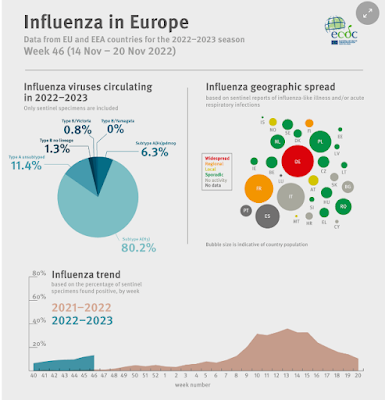#17,145
As the above graphic illustrates, this year's flu season is off to an early and robust start across Europe, and as we've just seen in the UK, healthcare delivery services are under increasing pressures.
Today, the EC, WHO, and ECDC released the following joint statement on this year's triple epidemic of influenza, RSV, and COVID-19.
Joint EC, WHO and ECDC statement: Influenza season epidemic kicks off early in Europe as concerns over RSV rise and COVID-19 is still a threat
1 Dec 2022
Joint statement by Commissioner for Health and Food Safety Stella Kyriakides, WHO Regional Director for Europe Dr Hans Henri P. Kluge and Director of the European Centre for Disease Prevention and Control Dr Andrea Ammon
The 2022-2023 influenza (flu) season epidemic is off to an early start in the European region as concerns over Respiratory syncytial virus (RSV) rise and COVID-19 is still being a threat.
The region is currently experiencing increasing circulation of influenza and RSV. Together with COVID-19, these viruses are expected to have a high impact on our health services and populations this winter. This highlights how important it is for vulnerable groups to get vaccinated against influenza and COVID-19 as well as for everyone to protect themselves and others from infections.
We are already seeing influenza viruses (A and B) circulating in different parts of the region. While circulating among all age-groups and particularly in children of school-age, influenza A viruses usually cause severe disease mostly for older people and those with chronic conditions.
An increasing number of people is being admitted to hospitals due to influenza, with hospital admissions rising since October. Our populations 55 years and older account for almost half of reported influenza hospital admissions.
In 23 countries reporting Severe Acute Respiratory Infection (SARI) data, hospitalised patients have been diagnosed mostly with type B viruses (85%), with children aged four years and younger being the most often affected.
RSV has also been on the rise since October, with some 20 countries and areas experiencing intensified RSV activity.
COVID-19 case rates, hospital- and intensive care unit (ICU) admissions, and death rates are currently low compared to the past 12 months, but this situation could change as new variants emerge, and the disease continues to strain healthcare resources.
With the continued impact of the COVID-19 pandemic and the circulation and health impact of other respiratory pathogens, it is challenging to predict how the new winter period will develop.
In view of this, we cannot afford to become complacent. We must step up vaccination programmes and preparedness measures across the region. The need to protect our populations’ health, especially the most vulnerable, is as strong as ever.
We continue to encourage the most vulnerable - older people, pregnant women, people with underlying health conditions such as heart disease, and health workers – to get vaccinated against seasonal influenza and COVID-19.
We cannot say it enough: Vaccination saves lives. It decreases the chances of being infected and reduces the risk of severe illness from COVID-19 and seasonal influenza.
Personal protective measures also help us keep all respiratory viruses – seasonal influenza, COVID-19 and RSV – at bay. We continue to urge everyone to protect themselves by taking simple but effective measures – from cleaning hands regularly, wearing well-fitting masks, particularly when in crowded, closed settings with inadequate ventilation, to staying away from others when ill with a respiratory virus.
It is also important for countries to monitor not only SARS-CoV-2, but also how influenza and RSV viruses are spreading and affecting people and health care systems. Reporting these findings to WHO/Europe and ECDC will help better understand the impact of several respiratory viruses co-circulating widely, and to further strengthen our prevention and control measures.
We also recommend clinicians to consider early antiviral treatments and prophylaxis for influenza, RSV and COVID-19, according to national guidance, for those who are at risk of severe disease, to prevent severe outcomes and reduce the burden on healthcare systems.
Only by being prepared, staying vigilant and continuing to do what we know works will we be able to overcome this winter’s challenge.
